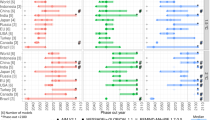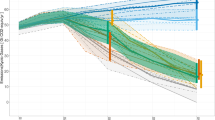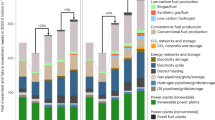Abstract
The Paris Agreement introduces long-term strategies as an instrument to inform progressively more ambitious emission reduction objectives, while holding development goals paramount in the context of national circumstances. In the lead up to the twenty-first Conference of the Parties, the Deep Decarbonization Pathways Project developed mid-century low-emission pathways for 16 countries, based on an innovative pathway design framework. In this Perspective, we describe this framework and show how it can support the development of sectorally and technologically detailed, policy-relevant and country-driven strategies consistent with the Paris Agreement climate goal. We also discuss how this framework can be used to engage stakeholder input and buy-in; design implementation policy packages; reveal necessary technological, financial and institutional enabling conditions; and support global stocktaking and increasing of ambition.
This is a preview of subscription content, access via your institution
Access options
Access Nature and 54 other Nature Portfolio journals
Get Nature+, our best-value online-access subscription
$29.99 / 30 days
cancel any time
Subscribe to this journal
Receive 12 print issues and online access
$209.00 per year
only $17.42 per issue
Buy this article
- Purchase on Springer Link
- Instant access to full article PDF
Prices may be subject to local taxes which are calculated during checkout

Ivan Pharabod.
Similar content being viewed by others
References
IPCC Climate Change 2014: Mitigation of Climate Change (eds Edenhofer, O. et al.) (Cambridge Univ. Press, 2014).
IPCC: Summary for Policymakers. in Special Report: Global Warming of 1.5°C (eds Masson-Delmotte, V. et al) (World Meterological Organization, 2018).
Winkler, H., Boyd, A., Torres Gunfaus, M. & Raubenheimer, S. Reconsidering development by reflecting on climate change. Int. Environ. Agreem. P. 15, 369–385 (2015).
Shukla, P. R., Dhar, S. & Mahapatra, D. Low-carbon society scenarios for India. Clim. Policy 8, 156–176 (2008).
Sachs, J. D., Schmidt-Traub, G. & Williams, J. Pathways to zero emissions. Nat. Geosci. 9, 799–801 (2016).
Rockström, J. et al. A roadmap for rapid decarbonization. Science 355, 1269–1271 (2017).
Moss, R. H. et al. The next generation of scenarios for climate change research and assessment. Nature 463, 747–756 (2010).
O’Neill, B. C. et al. A new scenario framework for climate change research: the concept of shared socioeconomic pathways. Climatic Change 122, 387–400 (2014).
O’Neill, B. C. et al. The roads ahead: narratives for shared socioeconomic pathways describing world futures in the 21st century. Global Environ. Chang. 42, 169–180 (2017).
von Stechow, C. et al. 2 °C and SDGs: united they stand, divided they fall? Environ. Res. Lett. 11, 034022 (2016).
Rogelj, J. et al. Paris Agreement climate proposals need a boost to keep warming well below 2 °C. Nature 534, 631–639 (2016).
Calvin, K. et al. The role of Asia in mitigating climate change: Results from the Asia modeling exercise. Energ. Econ. 34, S251–S260 (2012).
van der Zwaan, B., Calvin, K. & Clarke, L. Climate mitigation in Latin America: implications for energy and land use. Preface to the special section on the findings of the CLIMACAP-LAMP project. Energy. Econ. 56, 495–498 (2016).
Stern, N. Current climate models are grossly misleading. Nature 530, 407–409 (2016).
Pindyck, R. S. Climate change policy: what do the models tell us? J. Econ. Lit. 51, 1–23 (2013).
Chan, G., Carraro, C., Edenhofer, O., Kolstad, C. & Stavins, R. Reforming the IPCC’s assessment of climate change economics. Clim. Chang. Econ. 7, 1–16 (2016).
Geels, F. W., Berkhout, F. & van Vuuren, D. P. Bridging analytical approaches for low-carbon transitions. Nat. Clim. Change 6, 576–583 (2016).
Staub-Kaminski, I., Zimmer, A., Jakob, M. & Marschinski, R. Climate policy in practice: a typology of obstacles and implications for integrated assessment modeling. Clim. Chang. Econ. 5, 1440004 (2014).
Ackerman, F., DeCanio, S. J., Howarth, R. B. & Sheeran, K. Limitations of integrated assessment models of climate change. Climatic Change 95, 297–315 (2009).
Scrieciu, S. Ş., Barker, T. & Ackerman, F. Pushing the boundaries of climate economics: critical issues to consider in climate policy analysis. Ecol. Econ. 85, 155–165 (2013).
Van Vuuren, D. P. et al. Alternative pathways to the 1.5 °c target reduce the need for negative emission technologies. Nat. Clim. Change 8, 391–397 (2018).
Weyant, J. Some contributions of integrated assessment models of global climate change. Rev. Env. Econ. Policy 11, 115–137 (2017).
Pye, S. & Bataille, C. Improving deep decarbonization modelling capacity for developed and developing country contexts. Clim. Policy 16, S27–S46 (2016).
Chen, W., Wu, Z., He, J., Gao, P. & Xu, S. Carbon emission control strategies for China: a comparative study with partial and general equilibrium versions of the China MARKAL model. Energy 32, 59–72 (2007).
Jiang, K., Zhuang, X., Miao, R. & He, C. China’s role in attaining the global 2°C target. Clim. Policy 13, 55–69 (2013).
Smith, J. B. et al. Development and climate change adaptation funding: coordination and integration. Clim. Policy 11, 37–41 (2011).
Shukla, P. R. & Chaturvedi, V. Low carbon and clean energy scenarios for India: analysis of targets approach. Energ. Econ. 34, S487–S495 (2012).
Fujino, J. et al. Back-casting analysis for 70% emission reduction in Japan by 2050. Clim. Policy 8, 108–124 (2008).
Grottera, C., Pereira, A. O. & La Rovere, E. L. Impacts of carbon pricing on income inequality in Brazil. Clim. Dev. 5529, 1–14 (2015).
La Rovere, E. L., Burle Dubeux, C., Pereira, A. O. & Wills, W. Brazil beyond 2020: from deforestation to the energy challenge. Clim. Policy 13, 70–86 (2013).
La Rovere, E. L., Pereira, A. O., Dubeux, C. B. S. & Wills, W. Climate Change mitigation actions in Brazil. Clim. Dev. 6, 25–33 (2014).
Zevallos, P., Takahashi, T. P., Cigaran, M. P. & Coetzee, K. A case study of Peru’s efficient lighting nationally appropriate mitigation action. Clim. Dev. 6, 43–48 (2014).
Delgado, R., Cadena, A. I., Espinosa, M., Peña, C. & Salazar, M. A case study on Colombian mitigation actions. Clim. Dev. 6, 12–24 (2014).
Sanhueza, J. E. & Ladrón de Guevara, F. A. A case study of Chilean mitigation actions. Clim. Dev. 6, 34–42 (2014).
Winkler, H. Long Term Mitigation Scenarios. (Department of Environment Affairs and Tourism, Pretoria, 2007).
Tyler, E., Boyd, A. S., Coetzee, K. & Winkler, H. A case study of South African mitigation actions (for the special issue on mitigation actions in five developing countries). Clim. Dev. 6, 49–58 (2014).
Mathy, S., Fink, M. & Bibas, R. Rethinking the role of scenarios: Participatory scripting of low-carbon scenarios for France. Energ. Policy 77, 176–190 (2015).
Schmid, E. & Knopf, B. Ambitious mitigation scenarios for Germany: a participatory approach. Energ. Policy 51, 662–672 (2012).
Strachan, N., Pye, S. & Kannan, R. The iterative contribution and relevance of modelling to UK energy policy. Energ. Policy 37, 850–860 (2009).
Usher, W. & Strachan, N. Critical mid-term uncertainties in long-term decarbonisation pathways. Energ. Policy 41, 433–444 (2012).
Pye, S., Sabio, N. & Strachan, N. An integrated systematic analysis of uncertainties in UK energy transition pathways. Energ. Policy 87, 673–684 (2015).
Chiodi, A. et al. Modelling the impacts of challenging 2050 European climate mitigation targets on Ireland’s energy system. Energ. Policy 53, 169–189 (2013).
Samadi, S., Terrapon-Pfaff, J., Lechtenböhmer, S. & Knoop, K. Long-term low greenhouse gas emission development strategies for achieving the 1.5 °C target – insights from a comparison of German bottom-up energy scenarios. Carbon Manag. 3004, 1–14 (2018).
Williams, J. H. et al. The technology path to deep greenhouse gas emissions cuts by 2050: the pivotal role of electricity. Science 335, 53–9 (2012).
McCollum, D., Yang, C., Yeh, S. & Ogden, J. Deep greenhouse gas reduction scenarios for California - Strategic implications from the CA-TIMES energy-economic systems model. Energy Strateg. Rev. 1, 19–32 (2012).
Paltsev, S., Reilly, J. M., Jacoby, H. D. & Morris, J. F. The cost of climate policy in the United States. Energ. Econ. 31, S235–S243 (2009).
Ross, M. T., Fawcett, A. A. & Clapp, C. S. U. S. climate mitigation pathways post-2012: transition scenarios in ADAGE. Energ. Econ. 31, S212–S222 (2009).
Tuladhar, S. D., Yuan, M., Bernstein, P., Montgomery, W. D. & Smith, A. A top-down bottom-up modeling approach to climate change policy analysis. Energ. Econ. 31, S223–S234 (2009).
Bataille, C., Tu, J. J. & Jaccard, M. Permit sellers, permit buyers: China and Canada’s roles in a global low-carbon society. Clim. Policy 8, S93–S107 (2008).
Garibaldi, J. A. et al. Comparative analysis of five case studies: commonalities and differences in approaches to mitigation actions in five developing countries. Clim. Dev. 6, 59–70 (2014).
Strachan, N., Foxon, T. & Fujino, J. Low-carbon society (LCS) modelling. Clim. Policy 8, 3–4 (2008).
Kainuma, M., Shukla, P. R. & Jiang, K. Framing and modeling of a low carbon society: an overview. Energ. Econ. 34, S316–S324 (2012).
Pye, S. et al. Exploring national decarbonization pathways and global energy trade flows: a multi-scale analysis. Clim. Policy 16, 1–18 (2016).
Deep Carbonization Pathways Project Pathways To Deep Decarbonization - 2015 Synthesis Report (SDSN & IDDRI, 2015).
Bataille, C., Waisman, H., Colombier, M., Segafredo, L. & Williams, J. The Deep Decarbonization Pathways Project (DDPP): insights and emerging issues. Clim. Policy 16, S1–S6 (2016).
Bataille, C. et al. The need for national deep decarbonization pathways for effective climate policy. Clim. Policy 16, 7–26 (2016).
Argyriou, M. et al. The impact of the Deep Decarbonization Pathways Project (DDPP) on domestic decision-making processes – Lessons from three countries (DDPP, IDDRI, 2016).
Bataille, C. The Deep Decarbonization Pathways Project (Long Term Strategies, World Resources Institute, 2018).
Cherp, A., Vinichenko, V., Jewell, J., Brutschin, E. & Sovacool, B. Integrating techno-economic, socio-technical and political perspectives on national energy transitions: A meta-theoretical framework. Energ. Res. Soc. Sci. 37, 175–190 (2018).
Davis, S. J. et al. Net-zero emissions energy systems. Science 360, eaas9793 (2018).
Lempert, R. J. Shaping the next one hundred years: new methods for quantitative, long-term policy analysis. Technol. Forecast. Soc. 71, 305–307 (2003).
Morgon, G. & Henrion, M. Uncertainty: A Guide to Dealing With Uncertainty In Quantiative Risk and Policy Analysis (Cambridge Univ. Press, 1990).
Mathy, S., Criqui, P., Knoop, K., Fischedick, M. & Samadi, S. Uncertainty management and the dynamic adjustment of deep decarbonization pathways. Clim. Policy 16, S47–S62 (2016).
Lempert, R. J. et al. A general, analytic method for generating robust strategies and narrative scenarios. Manag. Sci. 52, 514–528 (2006).
Haasnoot, M., Kwakkel, J. H., Walker, W. E. & ter Maat, J. Dynamic adaptive policy pathways: a method for crafting robust decisions for a deeply uncertain world. Glob. Env. Change 23, 485–498 (2013).
Maier, H. R. et al. An uncertain future, deep uncertainty, scenarios, robustness and adaptation: how do they fit together? Environ. Modell. Softw. 81, 154–164 (2016).
Bataille, C., Sawyer, D. & Melton, N. Pathways to deep decarbonization in Canada (SDSN & IDDRI, 2015).
Altieri, K. et al. Pathways to deep decarbonization in South Africa (SDSN & IDDRI, 2015).
Virdis, M.-R. et al. Pathways to deep decarbonization in Italy (SDSN & IDDRI, 2015).
Shukla, P., Dhar, S., Pathak, M., Mahadevia, D. & Garg, A. Pathways to deep decarbonization in India (SDSN & IDDRI, 2015).
Criqui, P., Mathy, S. & Hourcade, J.-C. Pathways to deep decarbonization in France (SDSN & IDDRI, 2015).
Kainuma, M., Masui, T., Oshiro, K. & Hibino, G. Pathways to deep decarbonization in Japan (SDSN & IDDRI, 2015).
Hillebrandt, K., Samadi, S. & Fischedick, M. Pathways to deep decarbonization in Germany (SDSN & IDDRI, 2015).
Liu, Q. et al. Pathways to deep decarbonization in China (SDSN & IDDRI, 2015).
Pye, S., Anandarajah, G., Fais, B., McGlade, C. & Strachan, N. Pathways to deep decarbonization in the United Kingdom (SDSN & IDDRI, 2015).
Pfenninger, S., Hawkes, A. & Keirstead, J. Energy systems modelling for twenty-first century energy challenges. Renew. Sust. Energ. Rev. 33, 74–86 (2014).
Altieri, K. E. et al. Achieving development and mitigation objectives through a decarbonization development pathway in South Africa. Clim. Policy 16, 78–91 (2016).
Oshiro, K., Kainuma, M. & Masui, T. Assessing decarbonization pathways and their implications for energy security policies in Japan. Clim. Policy 16, S63–S77 (2016).
Denis, A. et al. Pathways to Deep Decarbonization in 2050 – How Australia Can Prosper in a Low Carbon World (SDSN & IDDRI, 2014); http://deepdecarbonization.org/wp-content/uploads/2015/09/AU_DDPP_Report_Final.pdf.
La Rovere, E., Gesteira, C., Grottera, C. & Wills, W. Pathways to deep decarbonization in Brazil (SDSN & IDDRI, 2015).
Williams, J. et al. Pathways to Deep Decarbonization in the United States (SDSN & IDDRI, 2014).
Denis-Ryan, A., Bataille, C. & Jotzo, F. Managing carbon-intensive materials in a decarbonizing world without a global price on carbon. Clim. Policy 16, S110–S128 (2016).
Bataille, C. et al. A review of technology and policy deep decarbonization pathway options for making energy intensive industry production consistent with the Paris Agreement. J. Clean. Prod. 187, 960–973 (2018).
Bruckner, T. et al. in Climate Change 2014: Mitigation of Climate Change (Edenhofer, O. et al.) 511–597 (IPCC, Cambridge Univ. Press, 2014).
McDowall, W. Exploring possible transition pathways for hydrogen energy: a hybrid approach using socio-technical scenarios and energy system modelling. Futures 63, 1–14 (2014).
Trutnevyte, E. et al. Linking a storyline with multiple models: A cross-scale study of the UK power system transition. Technol. Forecast. Soc. 89, 26–42 (2014).
Robiou Du Pont, Y. et al. Equitable mitigation to achieve the Paris Agreement goals. Nat. Clim. Change 7, 38–43 (2017).
Kartha, S. et al. Cascading biases against poorer countries. Nat. Clim. Change 8, 348–349 (2018).
Zhang, Y. & Shi, H.-L. From burden-sharing to opportunity-sharing: unlocking the climate negotiations. Clim. Policy 14, 63–81 (2014).
Winkler, H. & Rajamani, L. CBDR & RC in a regime applicable to all. Clim. Policy 14, 102–121 (2014).
Raupach, M. R. et al. Sharing a quota on cumulative carbon emissions. Nat. Clim. Change 4, (2014).
Pan, X., Elzen, M., den, Höhne, N., Teng, F. & Wang, L. Exploring fair and ambitious mitigation contributions under the Paris Agreement goals. Environ. Sci. Pol. 74, 49–56 (2017).
Höhne, N., den Elzen, M. & Escalante, D. Regional GHG reduction targets based on effort sharing: a comparison of studies. Clim. Policy 14, 122–147 (2014).
UNFCC. Pathways Initiative (2019); http://newsroom.unfccc.int/unfccc-newsroom/high-level-climate-champions-launch-2050-pathways-platform/
Boer, R. et al. Pathways to deep decarbonizing agriculture, forest and other land-uses sector in Indonesia (DDPP. 2016).
Rosenbloom, D. Pathways: An emerging concept for the theory and governance of low-carbon transitions. Global Environ. Chang. 43, 37–50 (2017).
Turnheim, B. et al. Evaluating sustainability transitions pathways: bridging analytical approaches to address governance challenges. Global Environ. Chang. 35, 239–253 (2015).
Fortes, P., Alvarenga, A., Seixas, J. & Rodrigues, S. Long-term energy scenarios: Bridging the gap between socio-economic storylines and energy modelling. Technol. Forecast. Soc. 91, 161–178 (2015).
Acknowledgements
This paper was supported by the Agence Nationale de la Recherche of the French government through the Investissements d’avenir (grant no. ANR-10-LABX-14-01) programme. The authors gratefully acknowledge the contribution of Ivan Pharabod for the design of Fig. 1.
Author information
Authors and Affiliations
Contributions
H.Wa. and C.B. conceived, drafted and revised the manuscript, and led the underlying analysis as coordinators of the Deep Decarbonization Pathways Project (DDPP). H.Wi and M.C contributed to the conception of the manuscript, the drafting of ‘Backcasting using long-term benchmarks’ and ‘A Paris-compatible pathway design framework’ sections, and to revisions of the manuscript. F.J. and P.S. contributed to the conception of the paper and to revisions of the manuscript. All authors substantively contributed ideas through their active participation in DDPP and critically reviewed the manuscript.
Corresponding author
Ethics declarations
Competing interests
The authors declare no competing interests.
Additional information
Journal peer review information: Nature Climate Change thanks Frans Berkhout, Yann Robiou du Pont and other anonymous reviewer(s) for their contributions to the peer review of this work.
Publisher’s note: Springer Nature remains neutral with regard to jurisdictional claims in published maps and institutional affiliations.
Supplementary information
Supplementary Information
Supplementary Discussion, Supplementary Tables 1 and 2.
Rights and permissions
About this article
Cite this article
Waisman, H., Bataille, C., Winkler, H. et al. A pathway design framework for national low greenhouse gas emission development strategies. Nat. Clim. Chang. 9, 261–268 (2019). https://doi.org/10.1038/s41558-019-0442-8
Received:
Accepted:
Published:
Issue Date:
DOI: https://doi.org/10.1038/s41558-019-0442-8
This article is cited by
-
A unified modelling framework for projecting sectoral greenhouse gas emissions
Communications Earth & Environment (2024)
-
Low carbon futures: assessing the status of decarbonisation efforts at universities within a 2050 perspective
Energy, Sustainability and Society (2023)
-
Bioupgrading of the aqueous phase of pyrolysis oil from lignocellulosic biomass: a platform for renewable chemicals and fuels from the whole fraction of biomass
Bioresources and Bioprocessing (2023)
-
Countries’ long-term climate strategies fail to define residual emissions
Nature Climate Change (2023)
-
Why residual emissions matter right now
Nature Climate Change (2023)



